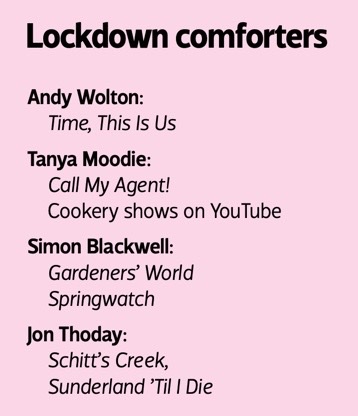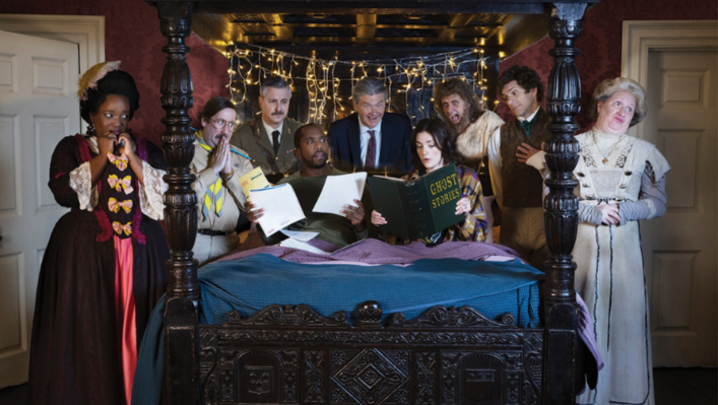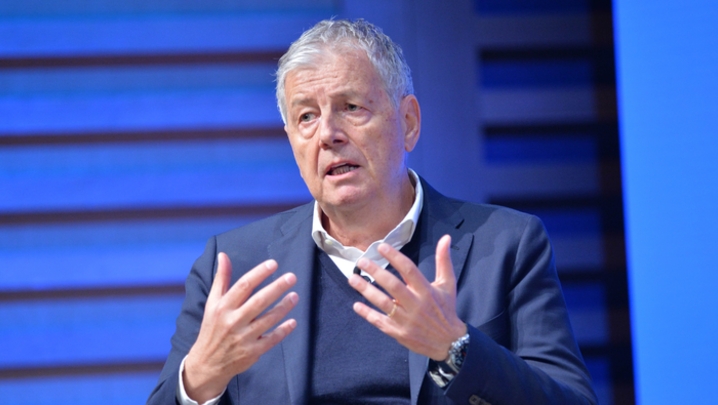Caroline Frost soaks up the warm glow of comfort comedy personified by the Friends reunion and BBC Three’s Starstruck.
Almost exactly two years ago, I was invited by this magazine to muse on what was then a wave of “sad-coms” or “dramedies”, those shows playing not quite for laughs but more for wry, sympathetic chuckles at the vicissitudes of life. The success of Detectorists, Back to Life, Don’t Forget the Driver, Ricky Gervais’s After Life, Mum and This Country served to prove that small-screen gags would, from now on, be accompanied by gulps in the throat.
Twenty-four months later, the world has changed beyond all prediction and, so it seems, has TV comedy. In place of those titles has come a string of upbeat shows such as Motherland and Starstruck on the BBC, Sky’s Breeders, We Are Lady Parts and Back on Channel 4, plus Trying and Ted Lasso on Apple TV+ – shows with equally strong characters facing everyday problems, but with a bigger laugh-out-loud ratio and challenges mostly resolved in 22 neat minutes.
While lockdown has meant that all types of TV have received 18 months of huge appreciation from viewers, it seems the feel-good funnies are experiencing a particularly bountiful renaissance. Even the romcom has risen from the ashes, with Starstruck following the same narrative arc as the 1999 film Notting Hill. What’s behind the change?
“People are looking around for ways to cope with our real-life predicament,” offers Andy Wolton, creator and writer of Trying, the first British scripted original on the Apple TV+ platform. His comedy stars Esther Smith and Rafe Spall as Nikki and Jason, a young couple going through the process of adopting a child. Nikki and Jason could be anyone’s neighbours, and the frictions between them are real but conquerable.
Wolton is delighted but not surprised by the success of his show, already recommissioned. “It’s a relief turning on the TV, seeing nice, flawed people being funny, doing their best to overcome things in their lives.”

Veteran comedy writer Simon Blackwell (The Thick of It, Veep) explores similar territory with Breeders, his Sky One show that sees another married couple Ally and Paul (Daisy Haggard and Martin Freeman) overtaxed by the challenges of bringing up young children. “There’s a universality to the experience,” muses Blackwell. “We all know that you would die for your children, but sometimes you want to kill them. We’re all in a community of falling short but doing our best, and hopefully we’ll get there in the end.”
Although the first series of Breeders was filmed pre-Covid, the serendipity of the show’s themes is not lost on him. “We weren’t to know to what extent it would echo people’s real lives,” he says. “We knew about the frustration of kids, but suddenly being with them 24/7… people were relating to the show in a way we could not have predicted.”
Blackwell says he received a message from one viewer: “He wrote, ‘When did you hide your cameras in my house?’” He adds: “I think it’s comforting for viewers to see it on screen, to know that other people are experiencing the same thing.”
The same could be said for his Channel 4 show Back, focusing on a family whose smooth running of a pub is thrown into chaos by the return of a long-lost foster brother. While the chemistry of its co-stars David Mitchell and Robert Webb lends an enigmatic edge to the comedy, the show nevertheless offers a similarly comforting setting and lightness that Blackwell explains he purposely focuses on in his writing.
“Some bleak stuff happens, but I try to make even the bleak stuff warm. I want people to take away something warm from watching.”
He’s clearly managed it, judging by one viewer’s reaction to the motley crew propping up the family’s bar. “They got in touch to tell me how much they’d like to live there, in the pub,” reports Blackwell. “They were drawn to that sense of real community – a community of flawed people, like all good sitcoms.”
Fans have been equally quick to identify with the competitive mothers – and father – gathered around the school gate in the BBC’s Motherland. “People are constantly contacting me to say ‘I’m Liz’ or ‘I’m Amanda’ or ‘I’ve got a friend who is exactly Kevin’,” says Tanya Moodie, who plays Meg in the show. “It’s nice, finding out you’re not alone in the weird, awful things you do – whether it’s gnarly relations in your loveless marriage, looking after your elderly parent or having to improvise a costume at the gate when you’ve forgotten it’s World Book Day.”
Do these characters really have a bond or are they just forced together through circumstance? “They would never normally hang out, they’re united by this arbitrary connection, as we all are with different things,” says Moodie. “Then something tests us [series three saw Meg facing a cancer diagnosis] and you realise, ‘This person’s actually my friend now.’ Sometimes, it takes hard times to find out. And those are the turning points…”
That sense of belonging, of knowing other characters may mock, joke and compete but ultimately have each other’s back, is something that runs through all of these hit shows.
This is present in lockdown’s biggest global hit, Schitt’s Creek, and, of course, almost defines the evergreen Friends, still one of Netflix’s biggest global shows, nearly two decades after it finished, and whose reunion brought Sky a record audience in May.
It is clearly no coincidence that, at a time of confusion, forced solitude for so many, fear for the future and sometimes even despair, such titles have so many millions tuning in, often for repeated viewings.
“These kinds of shows are all providing a comfortable, cosy world that I would want to live in,” says Andy Wolton. “There’s a tiny bit of sadness, because you need some adversity for a story, but ultimately things come good. We can invest in these stories without fear of going away unfulfilled. They bring us the happy ending we don’t always get in real life.”
For Moodie, who lost her father to Covid, these comedies have provided a particularly sweet alternate universe over the past year and a half: “In their world, it hasn’t happened. It’s not even a pre-Covid world where we were sick and didn’t realise. So we’re not looking at that world with the pressure of the clock ticking – instead, we can engage with a parallel universe where it hasn’t happened and it’s not going to.
“It’s soothing and reassuring to look at a rose-tinted world that hasn’t been sick and doesn’t have to heal.”
“People have definitely had enough of the Zoom chats and all the miserable news,” reflects Jon Thoday, executive producer of Starstruck, the timeless tale of “boy meets girl, boy just happens to be a famous film star” given a breath of fresh air in the hands of Kiwi comedian Rose Matafeo, who writes and stars. I hoped the one upside of lockdown could be that we could bring comedy to slightly different audiences from normal, with people just wanting a laugh.”
As the boss of Avalon, Thoday naturally hopes that the huge success of these shows will lead to commissioners investing more money in the genre and creating some prime-time, pre-watershed hits, as in days of old.
“Comedy’s always in evolution, it’s become more niche over the years, but the success of Starstruck and other shows such as Taskmaster show that audiences are hungry for it.”
After lockdown, he has a strong case. There’s no doubt that during this uniquely upsetting and challenging period, TV comedy has provided comfort and temporary respite.
“If you’re being told a good story and it’s making you laugh, then, for 22 minutes, life’s just that little bit easier,” suggests Simon Blackwell. “And there’s a particular joy in laughing along with other people and seeing their smiling faces… even if they are the same faces you’ve been staring at for months.”




